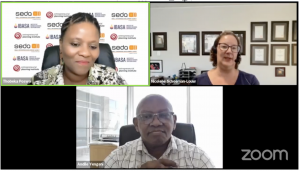
Webinar host Thobeka Poswa, with guests Nicolene Schoeman, a practicing lawyer and owner of PocketAdvisor.co.za, and Andile Yengeni, SEDA District Manager in Nelson Mandela Bay.
Broadly speaking, there are two types of businesses that can benefit most from formalising — those that are operating as informal, non-registered businesses and those that are registered businesses, but where their processes are not well structured. Both of these types of businesses can gain immensely from formalisation, but the owner-managers may not see the benefit and may therefore resist change.
This was the topic of the recent episode of the SEDA, IBASA & EPI Webinar Series for Small Business Support Practitioners. The most important discussion point was that business advisors can help their clients to formalise, so that their businesses can grow, by emphasising the ways the benefits the clients will derive outways the effort and costs.
Andile Yengeni, SEDA District Manager for Nelson Mandela Bay, explained that businesses trying to operate “under the radar” has little chance of surviving. “You come to a place where last year there was a thriving business, but now you find there is nothing because the business never took the steps to formalise itself and be prepared for growth,” he said.
Apart from being better equipped to survive, Yengenis explained that there are several other compelling advantages for informal businesses to formalise.
“If they are registered, they can get access to government assistance. We’ve seen with the Covid relief programmes how many businesses could not get support because they are informal. If they were registered and formally operated businesses, they would have been able to get assistance and those that had to close, may have survived,” Yengeni said. “And apart from emergency relief, the government also offers many other incentives that formal businesses have access to.”
Businesses that operate formally also provide safety to their employees as they can get benefits should an accident happen at work, or if their employment is terminated, they may benefit from UIF.
“One of the biggest advantages is that formalised businesses can build up a track record that banks and business financiers accept when they apply for finance,” Yengeni said. In emphasising these benefits, business advisors may help informal businesses to experience the growth that may follow formalising.
Yengeni explained during the webinar what business advisors must familiarise themselves with to help their clients to formalise. “Registration at CIPC and SARS, and opening a business bank account are the most obvious steps to take, but there are more to it as they also need to introduce new ways of doing financial management, collecting information for tax returns and completing annual financial statements. And when it comes to employment they must register at SARS for employee tax and with the labour department for UIF and OHS,” he said.
Many business owners are afraid of potential costs and that SARS may be a threat, but as Yengeni noted, it often happens that later down the line, if an informal business keeps growing, that SARS notices them, and then there is so much due, that the business eventually closes. It would have been much better to take the steps towards formalisation earlier on, as the business would then have been compliant and well-positioned for growth.
Nicolene Schoeman-Louw, a practising lawyer and owner of pocketadvisor.co.za, was the other guest on the webinar. She focussed on the options for businesses that may already have registered and that are paying taxes, but their business processes and relationships between shareholders and with staff, clients and suppliers may not be formalised.
“The traditional option is for a business to first consult with an attorney, which will take at least five to ten hours and may cost you R10 000 to R20 000. Then contracts must be done, which may cost from R100 000 to R150 000 for a typical business. And the process will take the business owner away from the business for at least 48 hours, plus it takes as long as six months,” she said.
She explained that there are alternatives, based on the business owner making use of online resources to get familiar with the issues before consulting a lawyer so that the billed time spent is reduced significantly, and so that the consultation is much more productive. “Business owners may also make use of template contracts, but to just download from the internet may result in difficulty later, as the templates may not be the most suitable or may even be for another country,” she said.
Schoeman-Louw mentioned that an online service she offers, called pocketadvisor.co.za, provides business owners with the option to subscribe for a monthly fee so that they have access to accurate online resources to prepare for consulting with a lawyer, plus template contracts specifically applicable to the South African context.
The presentations elicited good participation by the webinar attendees through text questions and being offered speaking turns.
Various comments and questions focussed on the difficulty in convincing clients that formalising is the best route for long-term growth, as they feel threatened by the cost implications and potential tax liabilities when they formalise.
These challenges will remain real for business advisors, especially those working with informal traders, who may not have the intention of growing their businesses beyond their current operation. It may indeed be best for business advisors to focus their efforts with business formalisation on the business owners who have a clear intention to grow their businesses significantly.
- To join the upcoming CPD webinar click here: << https://webinar.the-epi.org >>.
- By attending this episode of the SEDA, IBASA and EPI Small Business Development Practitioner Webinar Series, you will earn credits to count towards your CPD requirements.
- Christoff Oosthuysen is the webinar producer, founder of the Entrepreneurial Planning Institute (EPI), and General Partner at Seed South Capital.


